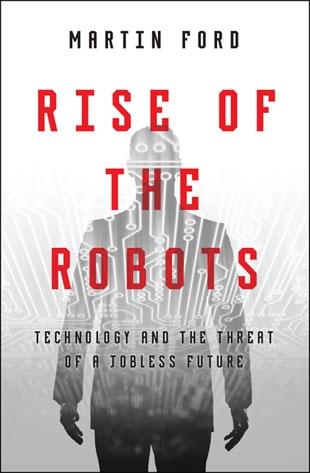America's golden age of increased productivity and rising wages has come to an end. On January 2, 2010, The Washington Post reported that the first decade of the twenty-first century resulted in the creation of no new jobs. Zero. That had not happened since the Great Depression.
Martin Ford is the founder of a Silicon Valley-based software development firm and has more than 25 years of experience in computer design and software development. In this wise and wide-ranging book, he surveys the impact robots and smart technology are having upon the economy, work, leisure, education, health care, and the acceleration of inequality and unemployment.
Cultural analysts once thought that human beings could keep up with robots through more education but that is no longer the case, given the rapid improvements in robotic technology. The machines offer a combination of speed, precision, and brute strength, which explains the trend of robots taking over white-collar jobs.
Ford lays out seven economic trends resulting from the transformative role of advanced information technology, including stagnant wages, declining labor force participation, soaring long-term unemployment, diminishing incomes for recent college graduates, and a gigantic leap in part-time work.
Alan Binder and Alan Krueger of Princeton University conducted an analysis of offshoring and discovered about 25 percent of U.S. jobs are at risk of being moved to low-wage countries. All of these developments signal how hard it will be for millions of people" to find a foothold in the economy of the future." In the closing chapters of Rise of the Robots, Ford covers a few of the challenges, downsides and uncertainties of what lies just around the corner. Most radical of all, the author proposes a redistribution of wealth in the form of a guaranteed basic income to enable the unemployed and others to keep the consumer economy intact. Meanwhile, Google just won a patent to start creating worker robots with personalities.
